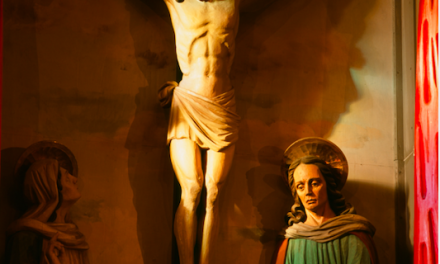Jesuit Fr. Peter Ryan, a moral theologian, has been appointed as the new head of the doctrinal committee of the USCCB. (For full disclosure, I served on committees with Fr. Ryan during his time at Mount St. Mary’s, and found him to be a very personable, warm, and kind presence, though I had no other interaction with him, as the Seminary faculty is entirely separate from my department at the Mount.) Josh McElwee has an excellent interview up at NCR, which I think reflects Fr. Ryan’s work and personality quite well.
In particular, it reflects Fr. Ryan’s particular theological background as a disciple of Germain Grisez’s system of moral theology. However, the interview doesn’t make this explicit, and understanding Fr. Ryan’s appointment and perspective requires some knowledge of Grisez’s unique system. Grisez has long been identified as “conservative,” and in particular is well-known for his opposition to proportionalism. Yet this oversimplifies his position. Grisez is not simply interested in defending norms – indeed, in the opening chapter of his major work, The Way of the Lord Jesus, he suggests that both “old” and “new” moral theology is “legalistic.” His solution to this problem is to focus on Vatican II’s eschatology.
One can see this clearly in Fr. Ryan’s interview, as he is asked about what will help theologians understand his view. He says a key question is:
…how do we understand the relationship between our human fulfillment and supernatural fulfillment?
It might seem as though this is pretty far from a concern of moral theology, but in fact if moral theology is all about being good, trying to understand what it means to do the right thing, there must be an intrinsic connection between that and what our fulfillment ultimately is — what the good, for us, is. … And I think what’s being offered is the full range of human fulfillment that we long for. And I think that one reason people don’t get too excited about heaven is that it seems distant and hard to relate to. … If we understood that it’s going to be a full-bodied human fulfillment and a supernatural fulfillment, then I think we’d find ourselves much more excited about it.
What Grisez’s system insists on is that post-Vatican II moral theology “should be both other-worldly and this worldly at the same time,” as Grisez writes. And the single most important reflection of this claim is the passage from Gaudium et Spes:
We do not know the time for the consummation of the earth and of humanity, nor do we know how all things will be transformed. As deformed by sin, the shape of this world will pass away; but we are taught that God is preparing a new dwelling place and a new earth where justice will abide, and whose blessedness will answer and surpass all the longings for peace which spring up in the human heart. Then, with death overcome, the sons of God will be raised up in Christ, and what was sown in weakness and corruption will be invested with incorruptibility. Enduring with charity and its fruits, all that creation which God made on man’s account will be unchained from the bondage of vanity.
Therefore, while we are warned that it profits a man nothing if he gain the whole world and lose himself, the expectation of a new earth must not weaken but rather stimulate our concern for cultivating this one. For here grows the body of a new human family, a body which even now is able to give some kind of foreshadowing of the new age.
Hence, while earthly progress must be carefully distinguished from the growth of Christ’s kingdom, to the extent that the former can contribute to the better ordering of human society, it is of vital concern to the Kingdom of God.
For after we have obeyed the Lord, and in His Spirit nurtured on earth the values of human dignity, brotherhood and freedom, and indeed all the good fruits of our nature and enterprise, we will find them again, but freed of stain, burnished and transfigured, when Christ hands over to the Father: “a kingdom eternal and universal, a kingdom of truth and life, of holiness and grace, of justice, love and peace.” On this earth that Kingdom is already present in mystery. When the Lord returns it will be brought into full flower.
Grisez insists throughout his work that all the “good fruits” of human life here will be “found again” in the end. We don’t abandon this world for some other one, but rather sow the seeds of the new creation here and now, in readiness for the harvest at the end.
This perspective therefore leads to a particular take on what the “problem” is in moral theology: namely, not one of mere disobedience to authority, but rather of an inability to recognize the claims and continuity of human fulfillment in both this life and the next. Drawing on the basic idea that Jesus exemplifies a life that is both fully human and fully divine, Grisez and Ryan insist that the Church’s moral norms protect “integral human fulfillment.”
To Grisez’s immense credit, his system does not merely focus on a few non-negotiables; rather, it is thoroughly rigorous in all areas of human life, with a scathing critique of consumerism and even a radical call for resistance to unjust military policies and action. Grisez chides those who “lessen the obligations of Christian life” by “attempting to show that certain kinds of acts cannot be proved to be always wrong.” In doing so, they name “following one’s conscience” what is in fact “doing as one pleases.” (One might wonder if politicians are listening on immigration, guns, drone strikes, and the like!) This rigor is born of the conviction that to follow Christ and the Church does not mean sacrificing temporal human fulfillment, but rather realizing it in a genuine way. Thus, in no case are Christians caught in a genuine “dilemma” between fulfilling different goods (hence, the animus toward any proportionalist calculations).
Moral theologians will be in more effective dialogue with Fr. Ryan if they recognize these basic convictions that animate him. Importantly, Fr. Ryan is aware of the problem that arises when the Church’s teachings appear legalistic and imposed from without, rather than as guides to genuine human fulfillment. Grisez’s system is surely worthy of theological debate – for example, I have always been troubled by the refusal to designate any kind of hierarchy of human goods. But constructive dialogue comes when there is recognition of the logic that animates competing positions. With the appointment of Fr. Ryan, moral theologians encounter someone who believes deeply in the genuine humanity of the Church’s official teachings. Other may (and surely will) disagree – but will often share this belief that the Church’s teachings should be ones that promote genuine human flourishing. I hope this common aim can help theologians and bishops have more constructive conversations in the future.





Trackbacks/Pingbacks